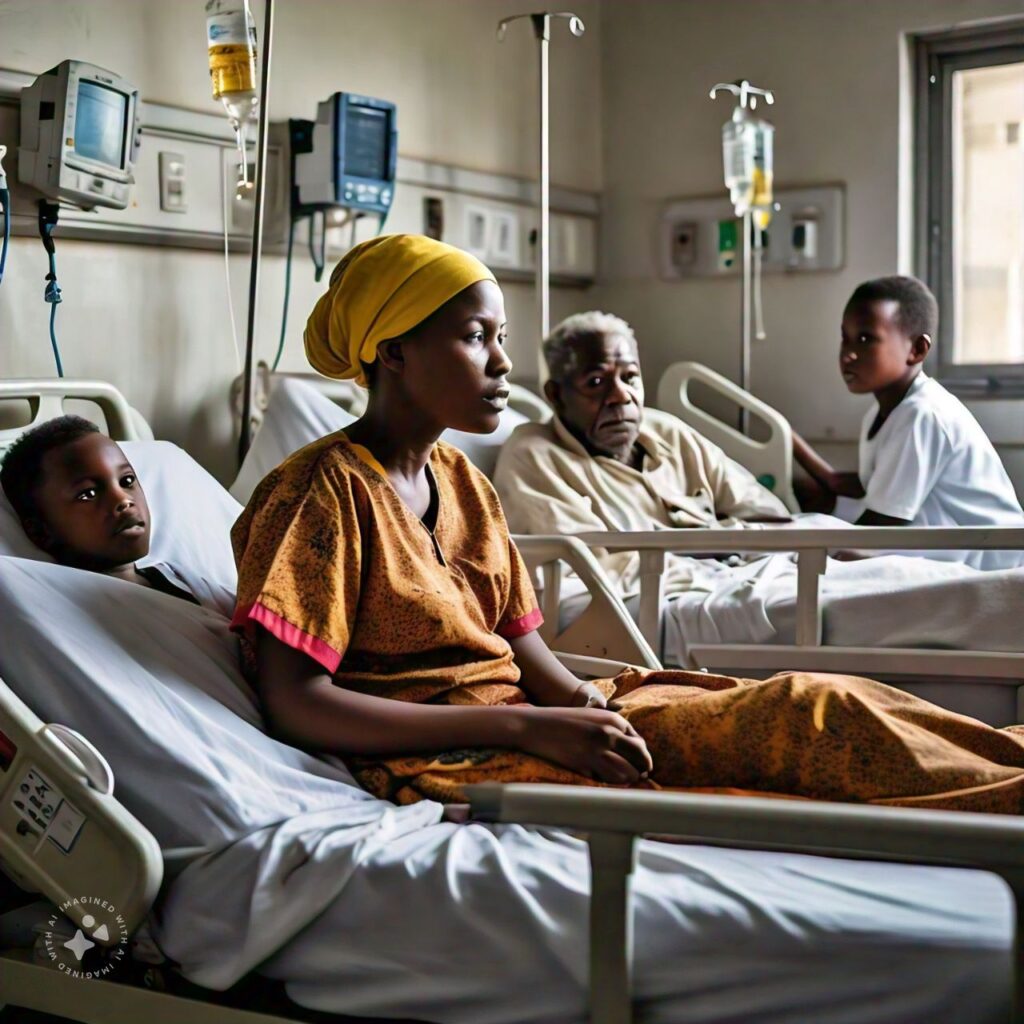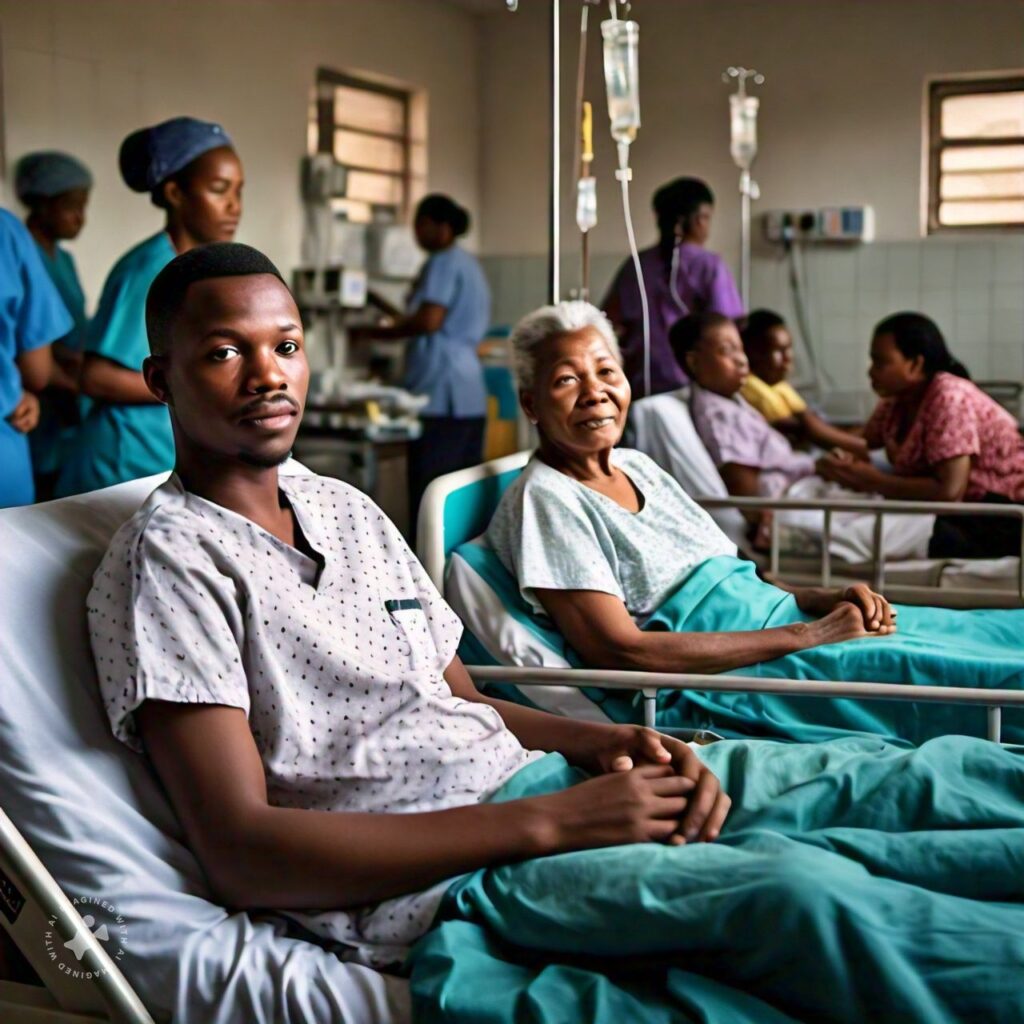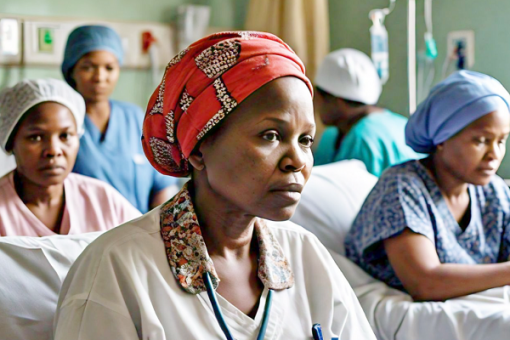There seems to be no respite for people living with HIV/AIDS in spite of government’s legislation against stigmatising them. GBENGA ADERANTI examines the trauma that many of them experience and the efforts they are making to fight the stigma.
Gloria’s glowing skin was a perfect complement for her plump figure. Her suave looks and confidence belied her past struggle with a health condition that was once regarded as a death certificate.
Yet life was once hell for the robust lady after contracting HIV at age 11. So much so that at some point in her life she wished she was dead. …CONTINUE READING


Contrary to the widely held belief that HIV is transmitted through sex, Gloria said she got infected in the process of blood transfusion. And while she is now bold enough to tell her story of triumph over public ridicule, many others in similar conditions cannot do so for fear of stigmatization.
According to Global HIV & AIDS statistics, about 39.9 million people worldwide were living with HIV in 2023. It was the same year that about 1.3 million people became newly infected while more than 630, 000 people died from AIDS-related illnesses.
No fewer than 88.4 million people are believed to have been infected with HIV since the outbreak of the epidemic in the early 1980s. In comparison, about 42.3 million people have died from AIDS-related illnesses since then.
Gloria recalled that at the time she contracted the virus in1999, the popular belief was that whoever tested positive for HIV was as good as dead.
“The victim must not be seen to stay close to anybody. It was not a funny experience,” she told The Nation.
Understandably, Gloria got infected at a time when antiretroviral drugs (ARV) were not easily available in the country. Hence it was big trouble for her family when it was discovered that she had the virus, such that she was rejected even in the church, where many expected her to find succour.
She said: “Whenever I wanted to enter the church, people would start avoiding me, not wanting to stay with me, to the extent that the presiding reverend advised my parents to take me to one of the general hospitals where people in my condition were kept so that I would die there.
“The feeling was that the mistake had been made and my parents should not allow me to infect the other children.
“To make matters worse, there had not been any breakthrough in the treatment of HIV/AIDS. It was just a period of experimentation and there was no medication on the ground.
“There was nothing to hold on to and say okay, this is what will make you want to live. Even within me, before anybody stigmatised me, I had stigmatised myself.
“If you talk about stigma, I faced it as a child. It was at the age of 11. When the drug came into Nigeria, I think I was one of the people they placed on an ARV drug.
“Then, it was not as treatment but as a trial; to see whether the drug would work. But at the government price, it was so expensive. It was about N50,000. I had to get it every month, and my dad would try to get a loan.
“The foul language of the people around him was not funny at all. That was how I ran away from home and stayed a long time without taking medication.
“That was what stigma caused me (laughs). It was an ugly experience I don’t like going back to, though I thank God that today, I’m living to tell the story.”
It got so bad that Gloria lost her self-esteem and even started stigmatising herself even in situations where people didn’t know about her HIV status.
She said: “If I greeted somebody on my way out, I would follow a different route on my way back because I would assume that they already knew about my condition.
“So, even I had condemned myself even if the person wanted to talk to me or associate with me.”
But Gloria was not the only one going through difficult times. Her father’s means of livelihood also suffered for it, ditto her mum’s; an experience she described as “ugly”.
Fortunately, while many of Gloria’s peers were being rejected by employers, Gloria was lucky to get employment with an agency that was sympathetic to her plight.
Admission gone awry
Many People Living With HIV/AIDS complain about not getting employed or being offered menial jobs they never liked, but the simple truth is that many of them do not have the requisite qualifications for such jobs. And Gloria would probably have been one of them but for the fact that she chose not to allow circumstances to determine the cause of her life.
Rather than wallow in self-pity and consign herself to fate, she chose to get an education by applying for admission in one of the faith-based institutions where she thought she could get succor, but how wrong.
She said: “I was offered admission, but later the VC called us together and said there was a particular screening they had not conducted.
“They didn’t tell us that they were doing an HIV test; they only told us that they were doing medical fitness.
“Our blood samples were collected. Later, the VC just announced publicly: ‘Sorry, we will not be able to give you admission’. He said my admission was being withdrawn because it was a missionary school and I was HIV positive.”
The reality hit her like a bullet. It was as if her entire life had been shattered. “I tried to commit suicide, but each time I tried, I would see somebody coming to rescue me,” she said
Since death refused to come, Gloria started looking for organisations where he could express herself that it was not her fault that she got infected but a hospital caused it through a blood transfusion.
Dream fulfilled
Her search for a platform finally came into reality with the Red Card Campaign, through which she visited many tertiary institutions around the country. Many of the students became emotional after listening to her story, and some openly shed tears.
“I told them I did not need pity; what I needed was their support to have an anti-stigma bill passed into law, and for them to sign the petition. They signed it and we took it to the National Assembly.
“We looked for their representative and gave it to them, saying this is what your students said that they need; they want this bill to be passed into law.”
Unraveling the myths about HIV
Contrary to the erroneous belief in certain quarters, Gloria had the opportunity to be married and the relationship produced two lovely children who were HIV-negative.
But the kids were not products of her first relationship. “I didn’t marry the first guy because I didn’t want to get married to an HIV-negative person; I just wanted someone of the same status, because I didn’t want a situation where someone would wake up one morning and use my status to insult me.
“That was why I felt anytime I missed my medication, I would have a partner who would tell me that it was time for my drugs, and when I fell sick, he would understand what he would do at the right time.
“But getting married to a negative person would be funny. That was why I cut that relationship with the guy, and he didn’t take it lightly with me.”
Rejected by neighbours
Her experience with neighbours was also not an easy one. She said their feeling was that she should go and die as they would not allow their children to get close to her. “They would tell their children, ‘Don’t go across the house’, ” she said.
“I remember being locked in the house where they would pass food under the door for me to eat. I was locked up like a prisoner,” she added.
Gloria said that many had thought she was going to die, but like a cat with nine lives, the more they stigmatised her, the more she clutched to life.
She said she probably would have died but for the support she got from groups and individuals like the Catholic Committee on AIDS (CACA), which has a support group where people living with HIV/AIDS meet once a month. There she was kept just for her to get hope.
She said: “One fine Saturday morning, I saw people coming for the support group meeting, and you would see them fighting for rice. I felt like these people had HIV, they are fighting for food and are not even crying that God should heal them.
“You know, there was this negative thought that I was having then. I had already told myself that they should stop deceiving me; that they should just allow me to die, and I just stopped taking my medication at that point.
“There was a supplement they called anti-wisdom. It was out of stock and somebody came to buy it in bulk with a Jeep, and he had a driver. I peeped through the window and I saw the jeep and the driver.
“I later asked someone if the owner of the jeep was also HIV positive, and the person said, ‘Yes. Is it not you who wants to die? Die now. That was when I picked up courage and went back to school.”
The turnaround
I returned home in full force, and my neighbours no longer believed that I was HIV positive. They thought I lied about my status so that the government would pay me big money. Even the T- shirt they were running away from before, they started begging me for it.
“They never believed that I was living with the virus; they thought that I scammed the government. Initially they called me a dead person, but the whole thing was now working in my favour.”
Advice for government, victims
Although the stigmatisation of the people living with HIV persists, Gloria advised that victims should first deal with themselves first, noting that “self-inflicted stigma kills faster than the virus.
She also suggested that every workplace should have a policy that talks about HIV and the law against stigmatisation.
She said: “We have what we call an anti-stigma act in place. The problem is that people don’t report the insults they get around them. People don’t talk, because they don’t want their faces to be known, they don’t want their names to be mentioned.
“Let them come up and report these cases. We have lawyers on ground that can take them up, and we have the anti-stigma bill waiting for somebody to violate it.”
“There are penalties against stigmatisation of people living with HIV /AIDS. We want people to talk. We want people to speak out if their rights are violated or if they are discriminated or stigmatized against because of their HIV status.
“Because of ignorance, many of the people living with HIV see themselves as handicapped. Rather than work, some of them prefer to resort to begging for alms.
“They want the government to do everything for them, forgetting that they are like every other human being out there. They are like every other human being with typhoid or malaria.”
How healthcare workers cause resentment among victims
It was gathered that while the government makes efforts to protect the PLWH, the attitude of the health care providers in most cases is worrisome.
“Our problem is the health care providers. They discriminate against people who come to access treatment. Because of that, we have lost many HIV-positive people.
“They don’t come to the facility anymore to take their medications, and babies are being born with HIV based on the kind of approach being used at the health setting.”
She advised that healthcare providers should be trained and retrained on how to handle PLWHs.
She also pleaded with the government to engage more of them in the hospitals.
Based on the UN projection, by 2030, there will be no more AIDS. But this can only be achieved if only qualified people with this virus are being employed in their various states or in their local governments or at the federal level. They are not just being employed, they are being paid salaries.
Gloria said: “Those of them who did not go to school, the government should empower them and let them have something for themselves.
“There is always the need for awareness on how HIV can be contracted. There is this misinformation that by hugging somebody, you can contract HIV.
“Even in the media, there is wrong information being passed out that HIV can only be contracted through sexual intercourse, forgetting that there are other means people can get infected.
“By the time the right information is passed out, things will be okay. Unfortunately, attention is focused on sex as the only way one could contract HIV/AIDS. What about the clipper? What about sharp objects?”
‘I don’t joke with my drugs’
Like her other colleagues who have not allowed their status to dampen their spirits, Lady B, another woman who is HIV positive, was looking every inch beautiful with nothing to betray her as someone living with the virus. Everything about her looked good and healthy.
“I don’t joke with my drugs. I take my medication regularly, ” she told our reporter.
Lady B had contracted HIV from an unusual place, though many still don’t believe her story. According to her, she got contracted via a broken bottle used on her by a fellow lady during a brawl.
Unknown to her, the lady first cut herself with the broken bottle, before she dealt a blow to Lady B with the same broken bottle. It was not until later that she realised she had been infected, though for à very long time, she lived in self-denial.
Unlike some others, Lady B lives in affluence as she has a lucrative paid job that fetches her good money, although her status is unknown to her employers as she resolved not to disclose it, based on previous experience.
While seeking a paid job, she needed to declare her status, and the job required counseling people living with HIV, where it was mandatory to share personal experiences with the clients.
However, within the job atmosphere, the other workers who were not positive were always treating others who were positive with disdain.
She said: “The stigma, the discrimination was quite obvious. Whenever they wanted to have a gathering of the staff, let me use the general hospital, for example, there is a way they keep people like us on one side.
“There is a particular department in general hospitals that has an ARV centre where people with HIV get their drugs, and it is not only ARV people that are working there.
“There is no way you would work in that vicinity and you would not be known, because we are the people who are supposed to showcase, let our clients have confidence in us. We have to make them come out of their shell, so we have to disclose our status to them. But by doing so, our secrets are not safe.
“So the ones that are not reactive will take that as an opportunity. Many of them do spread it. There is no OP or operation procedure. Had it been there was a law that binds you that within this department, there is a rule, there is guidance, there is nothing of such.
“That stigmatization is there in the public service system. In an NGO it is not like that. We don’t welcome that.”
It was the frustration that led Lady B to look for another job, where she would be free and she could visit a private hospital or a place where she was not known for her treatment.
“It is only the coordinator that knows our status. Even some of the clients that come to us don’t know my status, except when we have a party and we discuss more about ourselves. We are safe there.
“But in the general sector, it is not like that. The stigma is very obvious, and we are praying to the government that there should be a law that will bind them.”
When reminded that the government has legislation that forbids discrimination against people living with HIV, she doubted it, insisting that she never heard of anybody being punished for violating such a law.
According to Lady B, one of her clients whose fiancé was giving problems has a baby for the partner. But immediately he became aware of the woman’s status, he started making life difficult for the woman, and even rejected her.
“The lady’s predicament worsened because that man collected all the money the lady brought from Libya.
“Since she was rejected by the man, she asked him to return her money and it became a problem. Each time she made an attempt to get her money, he would turn it into violence.
“It became a police issue, and at the police station, the man disclosed to them that the lady was HIV positive. She cried and left the scene feeling bullied, stigmatized, and disgraced.”
To make matters worse, none of the police officers could do anything. She reported the case to Lady B, who promised to take it up.
The experiences of her colleagues whose status is known with stigmatization have been traumatic.
As at today, she said, her status is kept secret from her neighbours except her husband whom she described as “very supportive.”
Lady B once married, and the union produced a child who turned out to be negative and outside the country. It was when her ex-husband found out about her status that they separated.
She said: “I went through emotional trauma. I almost died that night. I was almost referred to a psychiatric hospital if not for my family.
“Almost all members of my family wanted to use that against me. One of them stood up and said if you ever show any attitude, for her to have trusted you and disclosed her status to you, so many of them were cautioning themselves.
“I think one of them told her son about it, and those ones are trying to avoid me. But as far as I am concerned, I don’t give a damn.
“I kept my status from my ex-husband until my mother died. There was this particular time when I was seriously ill. I told my ex about it and I nearly died because he was using it against me. He was messing up, carrying women up and down.
“Any time we had an issue, he would start raising his voice.”
She said her ex-husband was very loving, but once she declared her status, all hell was let loose.
As a way of fighting the trauma, she channeled her energy to her vegetable farm, watering the farm and transplanting vegetables. She also got a counselor to whom she paid huge sums of money.
“It was so bad that I got into alcohol and started smoking heavily. Although I’m not a drug abuser, I was taking cigarettes for me to sleep and calm my system.
“I was smoking so heavily I could finish a pack of cigarettes in a day, just for me to control my emotions.”
As if regretting her actions, she said the habit is currently affecting her health.
“There was nothing I could do, there was nobody that could console me until I met my present husband,” she said.
Finding love again
While Lady B had a nasty experience in her first relationship, her consolation is that the current relationship she is in right now is giving her joy.
Narrating how she met her present partner who is not HIV-positive, she said it was providence that brought them together.
Lady B said: “I was on my way to pick up something from abroad. Unfortunately, there was no vehicle. So he dropped from his vehicle and we boarded the same vehicle and the same bike took us to the same destination.
“Fortunately, we both lived in the same vicinity. He was surprised to have met me. It was a few months later that I disclosed my status to him.
“He didn’t believe me. He was shocked and really angry. But as a counselor, I made sure that what I did was something that would not affect him. I was able to protect him and myself.
“I persuaded him to follow me to my facility where I receive treatment. I refused to test him myself. When we got there, behold he was negative.
“He was so happy. He fell in love with me the more. He said I was lying, but I told him I wasn’t lying. I told him that the only thing I did was taking a risk to sleep with him without disclosing my status. I apologised and he forgave me.
“He loved me and saw in me the woman he wanted.”
Although she is not formally married to her current partner, she disclosed that the relationship would be formalised very soon.
She said: “We have gone to the registry. It wasn’t a loud event. We did our traditional wedding. He is also a divorcee.
“He has been supportive. Whenever I’m down, he would encourage me to go to the hospital and take care of myself.”
She said the joy she derived from the relationship had made her to further her studies in mental help in order to take care of not only herself but other people.
She is believing God to have another child for her present husband, not minding their age.
While admitting that PLWHs have the tendency to feel traumatised, strict medication adherence would surely mitigate whatever challenge they may have.
“It is better than malaria. It is better than diabetes. It is better than any other sickness you can think of,” she said.
She advised those who do not know their status to start checking it every three months.
“If you know you have multiple sex partners, ensure you go with condoms. Even condoms are 95 per cent, not 100 percent safe. But you need to live a positive life and ensure that you do the proper thing.
“Do you know that many people still don’t believe that I’m HIV-positive? I’m looking forward to having my home and NGO, so that I can take care of some of the people that are positive and hopeless.”
She advised people living with HIV/AIDS to be positive, insisting that they should not commit suicide. Rather, they should live a good life and do whatever other people do.




